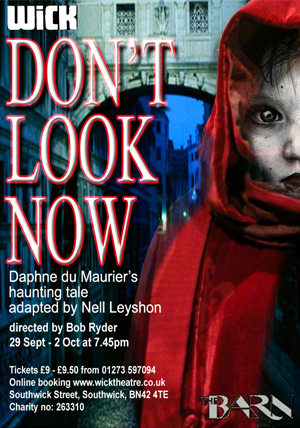Other parts played by members of the Cast.
BR wrote: “Don’t Look Now first appeared in 1970 as a short story by Daphne du Maurier. It then became widely known in a fine film version by Nicholas Roeg, released in 1973 – alongside another British cinema classic, The Wicker Man. Both films quickly gained quite a cult following, which has continued for nearly 40 years.
The stage play by Neil Leyshon is only three years old. It had a successful run at the Sheffield Lyceum in 2007, then in London at the Lyric Hammersmith. The adaptation, which is far more closely based on Daphne du Maurier’s original text, opens up many interesting possibilities in the live theatre.
The drama plays on the themes of loss and vulnerability, as experienced by the central couple. But it is driven forward by the themes of destiny and fate. How far do we foresee something happening, or even will it to happen – or is it fated to happen anyway, which ever way we turn? Perhaps the journey through the play should remind us of The Wicker Man: as events unfold and become more bizarre, is there only one inevitable path to its ending?”
Publicity #1: Don’t Look Now
Publication: Shoreham Herald
Publication Data: Unknown
Text Header: Spooky thriller
Text: Content
EVEN in the most romantic of settings, sinister things can happen. Amid the swirling mists of night-time Venice, the shadowy narrow streets and glimmering canals become menacing, and make it all too easy to miss your way.
This sets the scene for Wick Theatre Company’s production of Don’t Look Now by Daphne du Maurier. Her classic story is well-known from the 1970s film version, which has something of a cult following. Now, the powerful tale of haunting and imagination unfolds in a fascinating stage adaptation by Neil Leyshon, and is Wick’s entry for this year’s Brighton and Hove Arts Council drama awards.
Performances run from Wednesday, September 29, to Saturday, October 2, at the Barn, Theatre, Southwick, at 7.45pm. Tickets £9 for Wednesday and Thursday, £9.50 for Friday and Saturday, from the box office on 01273 597094, or www.wicktheatre.co.uk
A couple on a short holiday, John and Laura [Guy Steddon and Hazel Starns], are still mourning the death of their young daughter. At a café, they meet two intimidating sisters [Gill Medway and Diane Robinson]. One blind and clairvoyant, claims to have ‘seen’ the little girl sitting happily between her parents at the table. Laura is shocked and elated, while John doesn’t believe it. But the possibility of a supernatural presence becomes stronger. The blind sister has more alarming visions and John catches glimpses of danger and faces unknown fears.
Review #1: Don’t Look Now
Publication: Shoreham Herald
Publication Data: October 7 2010 issue – page 24
Reviewer: Sheena Campbell
Text Header: Playing a Venetian blinder
Text: Content
I WAS unsure how Daphne du Maurier’s haunting tale Don’t Look Now, would translate to the Barn Theatre, Southwick, stage. One of my colleagues had seen another, larger theatre company perform the play last year and been disappointed.
Luckily, the always reliable Wick Theatre Company did not disappoint.
Adapted for the stage by Neil Leyshon, Don’t Look Now explores the themes of love and loss as a couple, John and Laura, grieving for their young daughter try to find solace in the beautiful streets of Venice. At a café, they meet two sisters, one of whom is clairvoyant and claims to be able to “see” the little girl sitting happily at the table next to them. The sister, played by Diane Robinson, has more alarming visions and John, initially sceptical, catches a glimpse of danger ahead. The tension was built up gradually throughout the first half, culminating in a haunting scream which left the audience so shocked they forgot to clap.
In the second half, the suspense and sense of dread continued to build at an even faster pace and it felt as though, like me, most of the audience was holding their breath waiting to see what would happen.
The always excellent Guy Steddon continued to impress as John while Hazel Sterns [Laura] portrayed a mother’s grief with touching sensitivity and believability. Gill Medway and Diane Robinson were subtle and intriguing as the two sisters, leaving one guessing as to whether they were helping the couple or trying to lure them into a trap.
The supporting cast members, particularly Tony Brownings as the hotel clerk and David Creedon as the policeman, were also excellent. They seemed to reflect the feeling of the city itself – transforming it from a welcoming tourist location to a menacing presence in itself as John’s state of mind changes.
Directed by Bob Ryder, Don’t Look Now is Wick’s entry in this year’s Brighton and Hove drama awards. If the adjudicator was as impressed as I was, I am sure they will do well.
Review #2: Don’t Look Now
Publication: Brighton Argus
Publication Data: Unknown
Reviewer: Mary Kalmus
Text Header: Unknown
Text: Content
Venice, they say, is where the whole world meets. And where John and Laura try to fall in love again following the death of their young daughter, Christine.
A slow opening in which the couple construct a contrived and fragile cheerfulness, is soon superceded by the tension inherent in Daphne Du Maurier’s short story, brilliantly shaped for the stage by Nell Leyshon and cleverly directed by Bob Ryder. Laura’s recovery from her bereavement receives a setback when a blind woman tells her Christine is not, after all, completely gone. And John’s sanity is tested and found wanting by events both real and of his own imagining.
Guy Steddon delivers a considered John, revealing how an overdeveloped sense of his own importance can tip a weak man over the edge and into danger. Hazel Starns, meanwhile presents a sympathetic Laura filled with unspoken resentment and maternal guilt.
The supporting cast, chief among them weird sisters Gill Medway [the outspoken one] and Diane Robinson [the blind woman] add layers of colour and texture to the tragedy, while thoughtful lighting and staging evoke a vision of Venice dripping with intrigue and malice.
Review #3: Don’t Look Now
Publication: N.O.D.A – National Operatic and Dramatic Association
Reviewer: Phillip Hall – Regional representative for South East Region District 1 – Mid Sussex
Text: Content
In addition to the fact that the Company has to find two members capable of learning yards of dialogue, Don’t Look Now is very difficult to stage. By making the set very basic with just three gauzed windows and constructing a cat-walk extension from the stage, some of the required effect was achieved. The stage extension certainly helped to convey the movement about the City but the set itself did little to help create a sense of anything sinister.
There does seem to be a large amount of surplus dialogue. A great deal of the conversation betweens between John and Laura is pure padding and could tend to bore an audience rather than heighten tension. One can only be full of admiration for Guy Steddon, as John, who carries the brunt of the action and dialogue while Hazel Sterns was an excellent Lara. Both were as clearly spoken as could be wished for and mastered the script. They both lived their rôles showing their changes of emotions remarkably well.
Diane Robinson, as the Blind Sister, was beautifully and convincingly played. Had Gill Medway, her sighted sister, been more quietly spoken and somewhat less forceful, the sisters would have seemed more sinister. They are, after all, the creators of the mystery and tension.
All the remaining rôles were extremely well played with remarkably well maintained accents. Only very occasionally did we stray slightly north into wider Europe. The costumes were excellent with necessarily elegant hotel staff. The whole play was extremely well lit and this was largely responsible for creating the atmosphere – particularly the denouement. The scene changes were very neatly planned and effectively carried out.
The success of this story depends almost entirely on the creation of an ‘atmosphere’. Never quite achieving a sense of the supernatural, this was a brave effort at staging what could be a quite disturbing play.
[/showhide]





